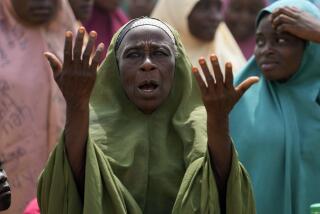They saw the uniforms and knew to run
- Share via
BAGHDAD — “They’re here! They’re here!”
The panicked cry rose from the crowd of shoppers and businessmen, sending them into a stampede past storefronts and shocked onlookers. Men, women and children fell over handcarts and folding chairs, knocking one another down, hiding behind buildings and seeking shelter in shops.
None knew who “they” were: uniformed men firing weapons in the air and herding people into trucks, just a few hundred yards from the edge of the U.S.-guarded Green Zone.
But most had suspected such a day might come to the Sinak market of downtown Baghdad. All knew to run at first sight of the uniformed gunmen who have become signature elements of the all-too-common mass kidnappings in the Iraqi capital.
“We weren’t really surprised,” said Hossein abu Marwa, an employee of an air conditioner shop in the sprawling market. “We face such threats on a daily basis. Sometimes we hear they’re coming from this side or that side. We don’t know who is shooting. We don’t know who is coming. Are they the resistance? Are they armed criminals? You don’t know if they’re Sunni. You don’t know if they’re Shiite.”
This time, at least five dozen people disappeared within minutes, stuffed into four delivery trucks and hauled away toward eastern Baghdad.
An Interior Ministry official reported later that at least 23 of the shopkeepers had been released unharmed in northern Baghdad, after showing their captors identity cards bearing names associated with Shiite Muslims.
The fate of previous victims of mass kidnappings has been brutal: Most show up dead within days, often with signs of torture, such as drill holes.
Thursday’s abduction took place in and around the auto-supply section of the open-air Sinak wholesale market, a few hundred yards from the headquarters of Iraq’s Defense Ministry.
It began around 10 a.m. when a convoy of about a dozen sport utility vehicles of the type often used by official security forces screeched into the market and sealed off the main roads, witnesses said.
Heavy gunfire erupted almost immediately.
Ghaith Abdul-Kahdem, owner of three shops in the marketplace, had been stuck in traffic and was arriving late for work, just as the kidnapping was unfolding. He heard the shots and saw police vehicles and quickly hid under a bridge.
“I saw the four-wheel-drive cars arrive, about 10 of them, as well as trucks for transporting prisoners,” he said. “I immediately realized something grave was going on.”
The shopkeepers said they clutched their guns as the drama began, fearful of criminals. When they realized the invaders came heavily armed and in official dress, they put their weapons away.
“They were men in uniform,” said Ahmad Jassem Saadi, 39, the owner of a leather jacket shop. “What could I do?”
“The raiders were selective at first,” Abdul-Kahdem said. “But after a while they started grabbing anybody.”
Saadi and other shopkeepers stood at the doors of their businesses and watched. “They detained a group of people, and then they started taking other sellers and even passersby,” he said.
“The people struggled. They were taken by force and put into trucks.”
Some described the trucks as the type used to transport milk and meat products.
Others said they were like armored vehicles used for transporting cash.
They began to fill up.
Abdul-Kahdem watched helplessly as the men stuffed four of his employees into the trucks.
The gunfire continued. The panic mounted.
Hassan Khafaji, shopping for a part to repair his broken-down 1990 Oldsmobile, lay on the ground as the shooting continued. He crawled to an alley, stood up and fled.
“I just kept running and running until I got somewhere safe,” he said.
Yassin Hashim, who works at a refrigerator motor shop within the market’s labyrinth of alleyways, helped an elderly man to his feet after the jittery mob knocked him to the ground. “He was too weak to get away,” Hashim said.
“Some people were running and screaming,” Saadi said. “Others were frozen in their place, watching.”
“They were just looking for a place to hide,” Hashim said. “Some people thought there were snipers.”
The ordeal was over within 15 minutes, witnesses said. A detachment of Iraqi soldiers arrived and sealed off the area. Some witnesses described the kidnappers as police commandos, but a spokesman for the Interior Ministry said the suspects wore army uniforms.
Afterward, Saadi gathered around a group of shopkeepers consoling a Christian restaurant owner, a middle-aged man with salt-and-pepper hair, who was weeping. His son had been taken. “It was painful and I felt very sad,” Saadi said.
By then, around 11:30, the streets had emptied. There were no customers and no shopkeepers. “I couldn’t work,” Saadi said. “We closed up the shop and went home.”
Special correspondents in Baghdad contributed to this report.
More to Read
Sign up for Essential California
The most important California stories and recommendations in your inbox every morning.
You may occasionally receive promotional content from the Los Angeles Times.









